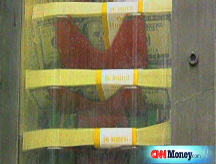Stable dollar could reverse oil run
It looks increasingly likely the Fed is through cutting rates - and that argues for a strengthening greenback and an end to surging oil prices.

NEW YORK (CNNMoney.com) -- Oil's relentless rise has been a major concern for investors and consumers. But is the worst over regarding the spike in energy prices?
Crude was trading at one point this morning at about $125.33 a barrel, down 7% from the $135.09 record price hit on May 22. But the price of oil rebounded to around $129 later in the day.
What's more, the U.S. dollar has started to stabilize against the euro, and many blame the weak dollar for the spike in the price of oil and other commodities.
One institutional investor source of mine joked with me a few months ago that it's not too hard to be a hedge fund manager in this environment: all you need to do is go long oil and short the dollar and then call it a day.
But that may be changing. Wendell Perkins, chief investment officer with money management firm Optique Capital Management, recently told me that he thought that oil around $100 a barrel is "probably where it should be" based solely on fundamentals and not speculation.
What's more, the Federal Reserve is sending a strong signal that it will not be cutting interest rates further. The Fed seems to have gotten the message that any more rate cuts could lead to an even weaker dollar and more upward pressure on the prices of gas and food.
In a speech last week, Dallas Federal Reserve president Richard Fisher, perhaps the most hawkish against inflation of the members on the Fed's policy-making committee, even hinted that rate hikes might be on the way.
"Purging rampant inflation and a debased currency requires administering a harsh medicine," Fisher said. "Even the perception that the Fed is pursuing a cheap-money strategy ... is a paramount risk to the long-term welfare of the U.S. economy. The Federal Reserve will never let this happen. It is not an option. Ever. Period."
The market has taken notice. The yield on the benchmark 10-Year U.S. Treasury note marched past 4% last week for the first time since January, a move sparked in part by inflation concerns and expectations of a rate hike.
And according to federal funds futures listed on the Chicago Board of Trade, investors are now forecasting a more than 50% chance of a quarter-point rate increase at the Fed's October meeting. In addition, traders are pricing in a strong likelihood of another increase in early 2009, which would leave the federal funds rate at 2.5%
Add all that up and you have a decent case for why the dollar could rebound in the next few months, which would be a welcome relief for consumers.
"I'm encouraged that the price of oil will continue to go down. And in my view, the Fed has finished cutting interest rates. The sum total of all this is that the dollar moves up," said Subodh Kumar, an independent market strategist.
So what's this all mean for investors and consumers? To start, a further decline in oil and a strengthening dollar should be good news for stocks.
"The pullback off peak oil prices favor equities, especially so if the retreat pulls crude back below $100/bbl," wrote David Garrity, director of research with investment firm Dinosaur Securities, in a note to clients Monday. "This development coupled with some signs of stability in the U.S. Dollar put us in the view that the equity market should fare reasonably well in June."
And if the markets rally, that is good news for the economy, even for those who may not have a lot of their money tied up in stocks.
Yes, I realize that the housing market remains a mess and many consumers are feeling the pinch of high food and gas prices. But stocks historically bottom out about halfway through an economic slowdown.
So keep an eye on oil and the dollar. If crude keeps heading lower and the dollar starts marching higher, that may mean that we are closer to the end of a recession than a beginning.
Issue #1 - America's Money: All this week at noon ET, CNN explains how the weakening economy affects you. Full coverage.
Gas prices have climbed to record levels. Are you feeling the pinch? Tell us how gas prices are affecting you and what you're doing to cope. Send us your photos and videos, or email us and tell us what you think. ![]()




